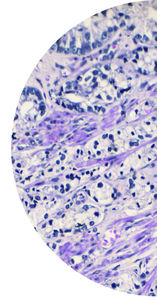
Cancer test kit GENESEEQLITE™oncologyfor precision medicineCNV
Add to favorites
Compare this product
fo_shop_gate_exact_title
Characteristics
- Applications
- for cancers
- Application field
- oncology, for precision medicine
- Tested parameter
- CNV, HRR, indel, LGR, MMR, MSI, SNV, TMB
- Sample type
- FFPE tissues
Description
GeneseeqLite™ is a compact panel that targets major actionable solid tumor genes. It includes variants implicated in hereditary cancers (POLE and POLD1), genetic alterations seen in non-small cell lung cancer (ALK, ROS1, BRAF, c-MET, RET, NTRK, KRAS and HER2) and genetic predispositions to reproductive cancers (BRCA1/2). GeneseeqLite™, like its predecessors, GeneseeqPrime™ and GeneseeqPrime™HRD, detects DNA mismatch repair (MMR) and microsatellite instability (MSI) – hallmarks of a cell’s inability to repair errors during DNA replication. Detection of these genetic features is relevant for determining a patient’s prognosis and identifying effective cancer treatments.
Coverage of critical exons and fusion-related introns in 196 known actionable genes found in solid tumors
Detection of targetable gene alterations informs targeted therapy, immunotherapy, PARP inhibitors for personalized treatment strategy
Detection of alterations in EGFR, BRAF, ALK, RET, ROS1, KRAS, ERBB2, MET and NTRK to inform targeted therapy
Detection of somatic and germline BRCA1/2 and homologous recombination pathway gene alterations to inform PARP inhibitor therapy
Detection of POLD1/POLE gene, microsatellite sites, and DNA mismatch repair (MMR) genes including MLH1, MSH2, MSH6, PMS2 to comprehensively evaluate the microsatellite instability (MSI) status
ctDNA-based liquid biopsy to monitor disease progression and predict the risk of postoperative/post-treatment tumor recurrence and metastases
Timely assessment of drug resistance and associated mechanisms to guide targeted therapy
Hereditary cancer risk assessment for early intervention
Catalogs
No catalogs are available for this product.
See all of Geneseeq‘s catalogsRelated Searches
- Assay kit
- Blood assay kit
- Plasma assay kit
- Molecular test kit
- Oncology test kit
- Tissue detection kit
- Genetic test kit
- Oncology test kit
- Genetic mutation detection kit
- FFPE tissues assay kit
- Cerebral test kit
- BRAF gene test kit
- Colorectal cancer test kit
- Lung cancer detection kit
- Genomic test kit
- Genomic DNA detection kit
- BRAF mutation detection kit
- NGS sequencing assay kit
- KRAS mutation detection kit
- Bone marrow assay kit
*Prices are pre-tax. They exclude delivery charges and customs duties and do not include additional charges for installation or activation options. Prices are indicative only and may vary by country, with changes to the cost of raw materials and exchange rates.






